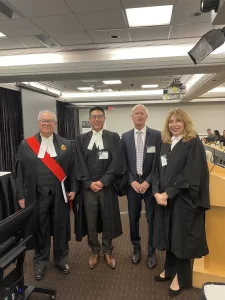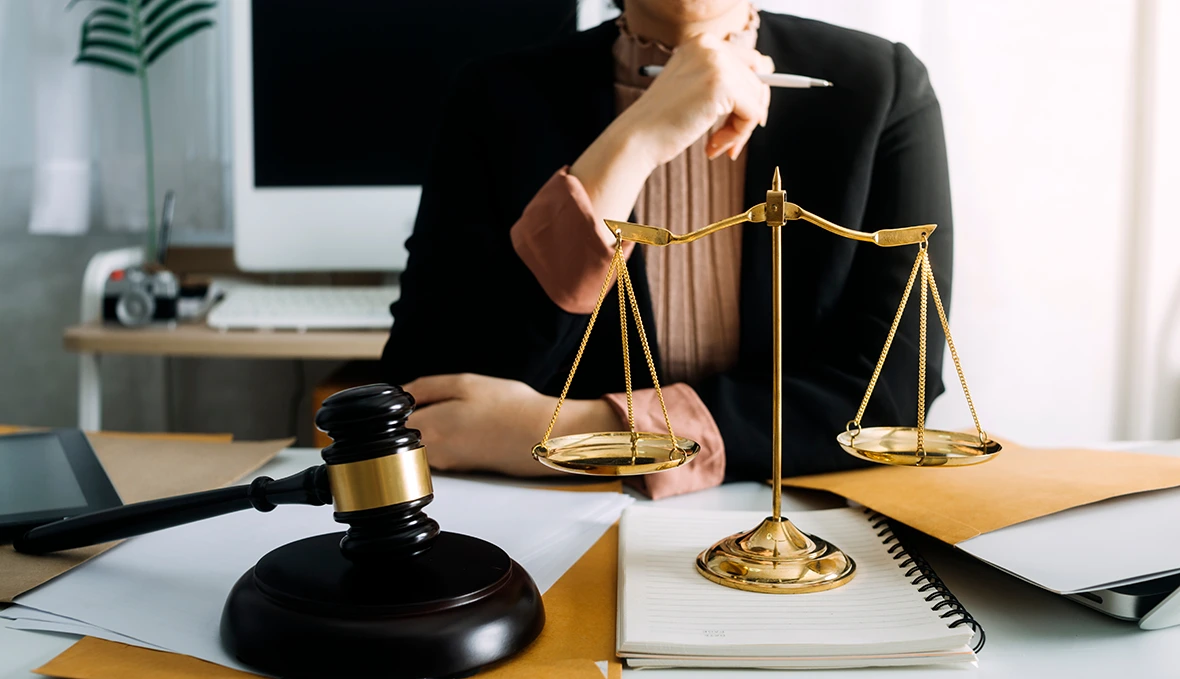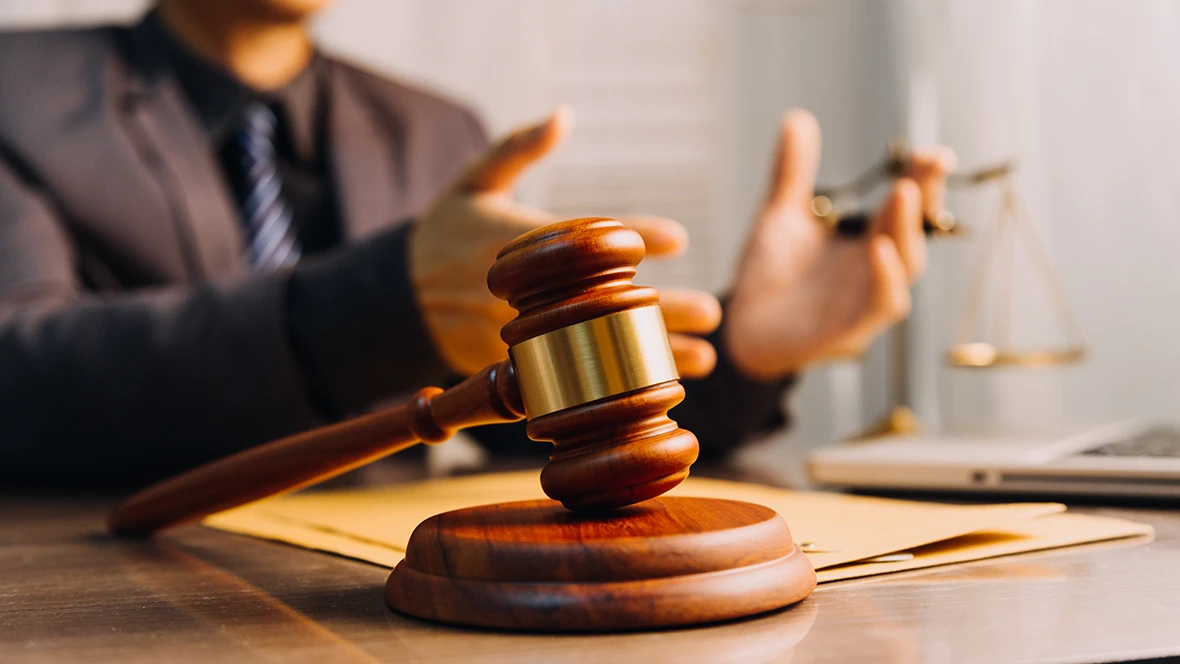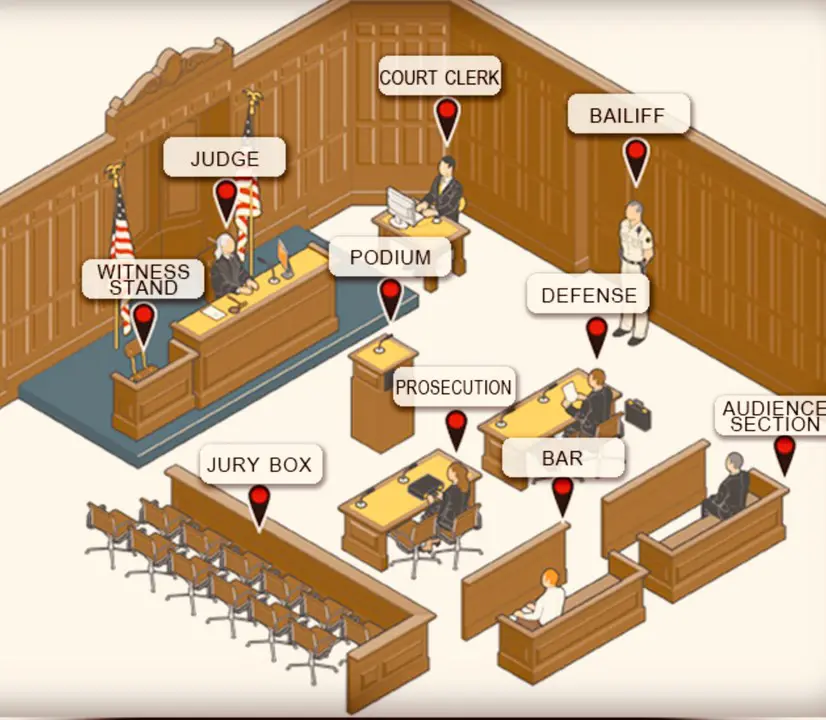Expert Witness Guide: “Don’t Look at Me, I Already Know the Answer”
Serving as an effective expert witness requires more than just technical knowledge; it demands strategic communication. A powerful lesson for any expert witness is encapsulated in the phrase, “Don’t look at me, I already know the answer.” This principle was vividly reinforced during my participation in the Ontario Bar Association Professional Development program, “Anatomy of A Trial: The New Essentials,” on Thursday, June 15th, 2023. I testified as a forensic toxicologist in a mock civil trial concerning a serious motor vehicle crash where one of the drivers recorded a blood alcohol concentration of 0.130 g/100mL in an Intoxilyzer 8000C.
The mock trial featured an actual judge, two experienced personal injury lawyers representing the opposing sides, and a mock jury of six individuals. The layout of the room presented an immediate challenge for any expert witness: the jury was placed very awkwardly, nearly behind your back when you were on the witness stand. Having testified primarily via video for several years due to COVID restrictions, I felt a little rusty returning to an in-person setting. This environment highlighted a critical aspect of testimony that is often overlooked—where you direct your attention.
Mastering the Dynamics as an Expert Witness
In this challenging setup, I relied heavily on the foundational tips I have previously shared, specifically the LUCAS Approach and Wigmore’s Rule. These methodologies provide a crucial framework for maintaining composure and ensuring your testimony is clear and credible. However, this particular experience underscored another, more physical aspect of being an expert witness: the importance of body language and audience engagement.
The physical arrangement of the courtroom proved difficult for witnesses. It is imperative that an expert witness looks at the jury while explaining complex concepts because the jurors are the most important deciders in the trial. Research and experience have consistently shown that if you do not face the people you are addressing when you talk, you come across as less credible and trustworthy. Furthermore, watching the jury while you speak provides invaluable real-time feedback on your effectiveness. You can observe if they are:
- Understanding your points
- Engaged and paying attention
- Yawning or becoming distracted
- Responding positively to your explanations
You cannot and should not face the jury for every single answer, especially in a physically awkward setup where constant swiveling would appear unnatural and distracting. My strategy was to face the lawyer who was asking the question directly. For short, factual responses like “Yes” or “No,” I would remain facing the lawyer. However, when a question required a detailed explanation or the presentation of a key scientific concept, I would deliberately turn my body and focus my attention entirely on the jury, addressing them directly.

Participants in the Mock Court (l to r), Honorable Michael G. Emery, Peter Cho, James Wigmore and Linda Matthews
The Ultimate Validation for an Expert Witness
When my one-hour session concluded, the organizers provided a critique. One organizer was particularly excited and affirmed that my conduct on the stand was exactly what he wanted to see from an expert witness. He was highly complimentary of my testimony and specifically highlighted this technique. His key complaint was that he constantly has to remind his own expert witnesses to face the jury when answering questions, often telling them, “Don’t look at me, I already know the answer.”
His point was powerful: the lawyer posing the questions is already familiar with the facts and the science. The individuals who need to be educated and persuaded are the members of the jury. This feedback perfectly encapsulates the core lesson for any expert witness aiming to maximize their impact.
The Credibility of an Experienced Expert Witness
The practical advice from the mock trial is grounded in a deep well of professional experience. With a career spanning over 29 years at Toronto’s Centre of Forensic Sciences and testimony provided in more than 700 criminal cases across Canada, along with numerous civil proceedings, the perspective offered comes from real-world application. This background ensures that the guidance is not just theoretical but proven under the pressure of actual litigation. Our services as an expert witness are built on this foundation of extensive courtroom experience and a commitment to clear, effective communication.
Contact us for a free forensic evaluation now!
Another essential expert witness tip is to direct your communication and focus your attention on the jury during the trial, not the lawyer who is asking the questions. Remembering the phrase, “Don’t look at me, I already know the answer,” can serve as a simple mental checklist to ensure you are connecting with the true audience. This practice, combined with rigorous scientific analysis and proven testimony techniques, ensures that your role as an expert witness is performed with maximum effectiveness and credibility, ultimately helping the trier of fact understand the critical evidence in your case.
Expert Witness FAQs
What does the phrase "Don't look at me, I already know the answer" mean for expert witnesses?
It’s a reminder that an expert witness should direct their testimony toward the jury—not the lawyer—because the jury is the audience that needs to understand and be persuaded by the information.
Why is it important for an expert witness to face the jury during testimony?
Facing the jury builds credibility and trust, allowing the expert to gauge reactions and ensure the information is being clearly received and understood.
What challenges do expert witnesses face in courtroom layout and setup?
Unusual courtroom arrangements, such as juries seated behind or to the side, can make it difficult for expert witnesses to engage effectively. Adjusting body language and eye contact is essential.
What role does body language play in effective expert witness testimony?
Positive body language, such as turning toward the jury during key explanations, enhances clarity, trust, and engagement—making the testimony more impactful.
Should expert witnesses always look at the jury while testifying?
Not always. For short or factual answers, it's fine to face the lawyer. But for detailed explanations, directing your focus to the jury is best.
How did the mock trial reinforce the value of facing the jury?
Feedback from organizers praised the technique, highlighting that most expert witnesses fail to engage with the jury and miss the opportunity to connect with the key decision-makers.
What are LUCAS and Wigmore’s Rule, and how do they relate to expert testimony?
These are structured methods for delivering clear and professional testimony. The article references them as foundational strategies used in the mock trial for maintaining credibility under pressure.
What does real-time jury feedback look like during expert testimony?
By watching the jury, an expert can see signs of understanding, confusion, distraction, or engagement, which helps tailor the delivery and clarify complex points.
How can an expert witness prepare for in-person trials post-COVID?
Reacclimating to physical courtrooms involves practicing in-person communication skills like eye contact, body orientation, and audience engagement—skills that were less emphasized during video testimony.
What qualifications support the credibility of the expert witness in this article?
The expert has over 29 years of forensic toxicology experience, has testified in 700+ criminal cases across Canada, and brings extensive courtroom insight into every case.
Recent News

Trials of A Forensic Toxicologist: Cross-Examinati...
Cross-examination represents the ultimate test of expert witness credibility, as the great legalist John Henry...
Read More
What Kind of Expert Testimony do You Provide in th...
Testimony skills in the courtroom define whether an expert witness succeeds or struggles in legal...
Read More
What Good are Defence Counsel Experts Anyways?
Defence counsel and their expert witnesses play a crucial role that I didn’t always appreciate....
Read More
Forensics Expert Witness: Courtroom Testimony Tips...
Forensics expertise and effective courtroom testimony go hand in hand when presenting evidence in personal...
Read More